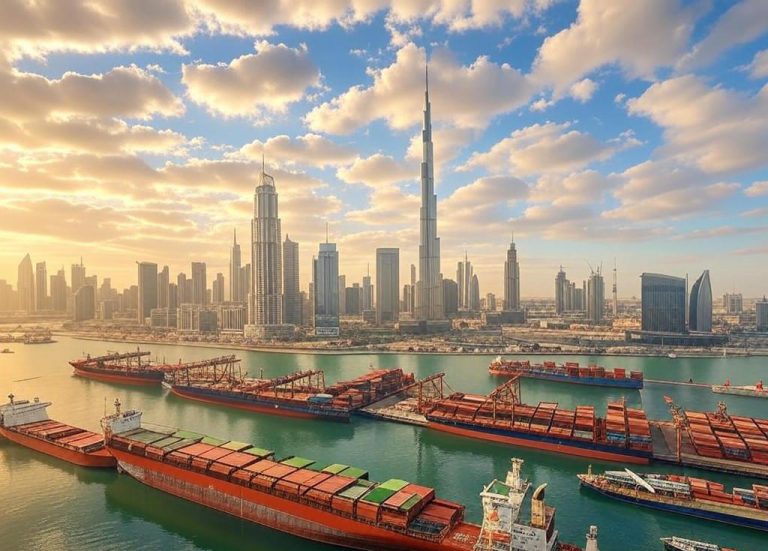Why Choose Dubai for Your Import-Export Venture?
Have you ever considered starting a business in a city that serves as a global trade hub? Dubai, with its strategic location and unmatched infrastructure, is the perfect launchpad for an import-export business in Dubai. Nestled between East and West, this vibrant emirate offers unparalleled access to markets across Asia, Europe, and Africa, making it a magnet for entrepreneurs and investors. Whether you’re looking to trade goods or expand your reach, Dubai’s unique advantages can set you on the path to success.
In this section, we’ll explore why Dubai stands out as a prime destination for import-export ventures. From its business-friendly policies to its world-class logistics, let’s uncover the reasons that make this city an ideal choice for your next big business move.
Strategic Location and Market Access
Dubai’s geographical position is a game-changer for any import-export business. Situated at the crossroads of major trade routes, it connects over 2.2 billion consumers within a four-hour flight radius. The city’s proximity to key markets in Asia, Africa, and Europe ensures faster shipping times and lower costs, giving businesses a competitive edge. Additionally, Dubai’s time zone facilitates seamless communication with partners worldwide.
Imagine shipping goods from Asia to Europe with Dubai as your transit hub. The efficiency and connectivity make it a no-brainer for entrepreneurs looking to maximize reach and minimize overheads. This strategic advantage is one reason why so many global companies base their operations here.
Business-Friendly Environment
Dubai is renowned for its pro-business policies, which are designed to attract foreign investment. The UAE government offers tax exemptions, free zones, and simplified licensing processes, making it easier to set up an import-export business in Dubai. Free zones like Jebel Ali Free Zone (JAFZA) allow 100% foreign ownership, no customs duties on re-exports, and access to state-of-the-art facilities.
Moreover, the regulatory framework in Dubai is transparent and efficient. Entrepreneurs can complete business registration, obtain visas, and secure permits with minimal hassle. This ease of doing business is a significant draw for startups and established firms alike, ensuring you can focus on growth rather than red tape.
Understanding the Import-Export Landscape in Dubai
Before diving into the import-export business, it’s crucial to understand the market dynamics and opportunities in Dubai. The city’s economy thrives on trade, with billions of dollars in goods moving through its ports and airports annually. From electronics and textiles to food and machinery, the range of products traded here is vast, catering to diverse global demands.
This section will break down the key sectors driving trade in Dubai and highlight how you can identify lucrative niches for your business. Let’s explore the landscape and see where your venture might fit.
Key Sectors and Products
Dubai’s import-export market is dominated by specific sectors that reflect both global trends and local needs. According to Dubai Customs, top exports include gold, diamonds, and petroleum products, while imports often comprise machinery, vehicles, and consumer goods. The city also serves as a re-export hub for electronics, textiles, and food items to neighboring GCC countries.
Here are some high-demand product categories to consider:
– Gold and precious metals: A major export sector with consistent global demand.
– Food and beverages: High import needs due to Dubai’s growing population and tourism.
– Construction materials: Fueled by ongoing infrastructure projects across the UAE.
– Electronics: A staple in both import and re-export markets.
Identifying the right product can make or break your business. Conduct thorough market research to understand demand, competition, and pricing trends before committing to a niche.
Role of Free Zones in Trade
Free zones play a pivotal role in Dubai’s import-export ecosystem. These designated areas offer tax exemptions, zero customs duties on imported goods for re-export, and streamlined logistics. Jebel Ali Free Zone, Dubai Multi Commodities Centre (DMCC), and Dubai Airport Free Zone are among the most popular for trade-focused businesses.
For instance, JAFZA handles over 30% of the UAE’s non-oil trade, providing access to one of the largest ports in the region. Setting up in a free zone not only cuts costs but also connects you to a network of suppliers, buyers, and logistics providers. This environment can significantly boost the scalability of your import-export business in Dubai.
Steps to Start an Import-Export Business in Dubai
Starting a business in Dubai may seem daunting, but with the right guidance, it’s a straightforward process. The city’s structured systems and supportive services make launching an import-export venture accessible, even for first-time entrepreneurs. Whether you’re sourcing goods from Asia or exporting to Europe, having a clear roadmap is essential.
Let’s walk through the essential steps to set up your business. With expert support from partners like Persian Horizon’s Business Launch Service, you can ensure a seamless start in this dynamic market.
Research and Planning
Every successful business begins with a solid plan. Start by researching the market to identify products with high demand and low competition. Analyze trade data, study consumer preferences, and evaluate potential suppliers and buyers. A well-thought-out business plan should outline your goals, target market, budget, and growth strategy.
Next, decide on the legal structure of your business. Will you operate in a free zone or mainland Dubai? Each option has unique benefits, such as tax incentives in free zones or broader market access in the mainland. Consulting with experts can help you make an informed decision.
Licensing and Registration
Obtaining the right trade license is a critical step. In Dubai, you’ll need a commercial or trading license specific to import-export activities. The Department of Economic Development (DED) handles mainland registrations, while free zone authorities oversee setups in designated areas.
Here’s a quick checklist for licensing:
– Choose a business name and get it approved.
– Submit required documents, including a business plan and passport copies.
– Pay the licensing fees and secure a trade license.
– Open a corporate bank account and apply for necessary visas.
Partnering with a trusted firm like Persian Horizon can streamline this process, ensuring compliance and saving you time.
Navigating Challenges in the Import-Export Sector
While Dubai offers immense opportunities, running an import-export business comes with its share of challenges. From regulatory hurdles to logistical complexities, being prepared is key to overcoming obstacles. Understanding these potential pitfalls can help you build a resilient operation.
In this section, we’ll discuss common challenges and provide actionable tips to address them. With the right strategies, you can turn hurdles into stepping stones for growth.
Regulatory Compliance and Customs
Navigating customs regulations is often the biggest challenge for new importers and exporters. Dubai has strict guidelines on documentation, tariffs, and prohibited goods. Failure to comply can result in delays, fines, or confiscation of shipments. Staying updated on UAE trade laws and ensuring accurate paperwork is non-negotiable.
To avoid issues, consider hiring a customs clearance agent or partnering with a consultancy. Additionally, leverage resources from Dubai Customs’ online portal for real-time updates and guidance. A proactive approach can save you from costly mistakes.
Logistics and Supply Chain Management
Efficient logistics are the backbone of any import-export business in Dubai. Delays in shipping, high transportation costs, or unreliable suppliers can disrupt operations. Dubai’s advanced infrastructure, including Jebel Ali Port and Al Maktoum International Airport, offers solutions, but planning is critical.
Invest in robust supply chain software to track shipments and manage inventory. Build strong relationships with logistics providers to negotiate better rates and ensure timely deliveries. Small steps like these can significantly improve your operational efficiency.
Leveraging Support Services for Business Growth
One of the secrets to thriving in Dubai’s competitive market is tapping into expert support. From investment consulting to marketing, specialized services can accelerate your growth and help you navigate complexities. This is where partnering with a trusted name can make all the difference.
Let’s explore how comprehensive support, such as that offered by Persian Horizon Services, can elevate your import-export venture. Whether it’s staffing or promotion, the right guidance can set you apart.
Investment and Funding Solutions
Securing funding is often a hurdle for new businesses. However, Dubai’s vibrant investment ecosystem offers numerous opportunities, from venture capital to bank loans. Tailored guidance can help you connect with the right investors and prepare compelling pitches.
Through Persian Horizon’s Investment Consulting Services, you can access expert advice on sourcing funds and scaling your operations. Their team ensures you’re equipped to seize financial opportunities and achieve long-term goals.
Marketing and Brand Visibility
Standing out in Dubai’s crowded market requires strategic promotion. Building a strong brand presence, both online and offline, can attract buyers and partners. From digital campaigns to market research, a focused approach to marketing is essential for growth.
With Persian Horizon’s Business Sale & Promotion Service, you can elevate your brand through tailored campaigns designed for the UAE market. Their expertise ensures maximum visibility and engagement for your import-export business.
Scaling Your Business with Strategic Development
Once your business is up and running, the focus shifts to expansion. Scaling an import-export business in Dubai requires strategic planning, partnerships, and operational optimization. The city’s dynamic market offers endless possibilities for those ready to seize them.
This section will guide you on how to grow sustainably. With support like Persian Horizon’s Business Development Service, you can craft a roadmap for long-term success.
Building Strategic Partnerships
Collaborations can open doors to new markets and resources. Partnering with local distributors, international suppliers, or logistics firms can enhance your reach and capabilities. Networking events and trade shows in Dubai, such as Gulfood or GITEX, are great places to connect with potential allies.
Focus on building trust and mutually beneficial relationships. A strong network can provide insights, reduce costs, and help you navigate market fluctuations effectively.
Hiring the Right Talent
A skilled team is vital for scaling any business. From logistics coordinators to sales managers, hiring the right talent ensures smooth operations and customer satisfaction. Dubai’s diverse workforce offers a pool of qualified professionals ready to contribute to your success.
Consider leveraging Persian Horizon’s Hiring and Staffing Services to build a capable team. Their expertise in recruitment and HR compliance can help you find and retain the best talent for your business.
Final Thoughts on Thriving in Dubai’s Trade Market
Dubai’s position as a global trade powerhouse makes it an extraordinary place to launch and grow an import-export business. With its strategic location, business-friendly policies, and world-class infrastructure, the city offers endless opportunities for entrepreneurs. By understanding the market, navigating challenges, and leveraging expert support, you can build a thriving venture that stands the test of time.
Ready to take the next step? Connect with Persian Horizon today at +97142544524 or email Contact@persianhorizon.com to explore how their tailored services can help you succeed. For more insights on doing business in Dubai, check out their blog or listen to their podcast for expert tips and stories from the field. Your journey to success starts now—let’s make it happen together!







